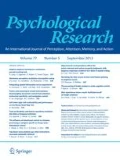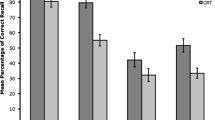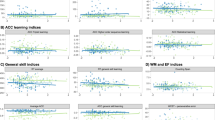Summary
The aim of the study was to investigate the effect of spending one night without sleep on the performance of complex cognitive tasks, such as problem-solving, in comparison with a purely short-term memory task. One type of task investigated was immediate free recall, assumed to reflect the holding capacity of the working memory. The other type of task investigated was represented by syntactical reasoning and problem-solving tasks, assumed to reflect the processing (the mental transformation of input) and monitoring capacity of the working memory. Two experiments with a repeated-measures design were performed. Experiment 1 showed a significant decline in performance as a function of sleep loss on Raven's progressive matrices, a problem-solving task. No other main effect of sleep loss was found. Experiment 2 had a different order between tasks than Experiment 1 and the time without sleep was increased. A number-series induction task was also used in Experiment 2. A significant, negative effect of sleep loss in performance on Raven's progressive matrices was found in Experiment 2. The effects of sleep loss on the other tasks were nonsignificant. It is suggested that Raven's progressive-matrices task reflects the ability to monitor encoding operations (selective attention) and to monitor mental “computations”.
Similar content being viewed by others
References
Angus, R. G., & Heslegrave, R. J. (1985). Effects of sleep and sustained cognitive performance during a command and control simulation.Behavior Research Methods, Instruments and Computers, 17, 55–67.
Babkoff, H., Mikulincer, M., Caspy, T., Kempinski, D., & Sing, H. (1988). The topology of performance curves during 72 hours of sleep loss: A memory and search task.Quarterly Journal of Experimental Psychology, 40A, 737–756.
Baddeley, A. D. (1968). A 3 min reasoning test based on grammatical transformations.Psychonomic Science, 10, 341–342.
Elkin, A. L., & Murray, D. J. (1974). The effects of sleep loss on short-term recognition memory.Canadian Journal of Psychology, 28, 192–198.
Englund, C. E., Ryman, D. H., Naitoh., P., & Hodgdon, J. A. (1985). Cognitive performance during successive sustained physical work episodes.Behavior Research Methods, Instruments and Computers, 17, 75–85.
Folkard, S. (1975). Diurnal variations in logical reasoning.British Journal of Psychology, 66, 1–8.
Folkard, S. (1979). Changes in immediate memory strategy under induced muscle tension and with time of day.Quarterly Journal of Experimental Psychology, 31, 621–633.
Hamilton, P., Hockey, R., & Rejman, M. (1977). The place of the concept of activation in human information processing theory: An integrative approach. In S. Dornic (Ed.).Attention and performance, VI. Hillsdale, NJ: LEA.
Hasher, L., & Zacks, R. T. (1979). Automatic and effortful processes in memory.Journal of Experimental Psychology: General, 108, 356–388.
Haslam, D. R. (1982). Sleep loss, recovery sleep and military performance.Ergonomics, 25, 163–178.
Hockey, R. (1973). Changes in information-selection patterns in multisource monitoring as a function of induced arousal shifts.Journal of Experimental Psychology, 101, 35–42.
Johnson, L. C. (1969). Psychological and physiological changes following total sleep deprivation. In A. Kales (Ed.),Sleep: Physiology and pathology, Philadelphia: Lipincott.
Kahneman, P. (1973). Attention and effort, Englewood Cliffs, N. Prentice Hall.
Kjellberg, A. (1975). Effects of sleep deprivation on performance of a problem solving task,Psychological Reports, 37, 479–485.
May, J., & Kline, P. (1987). Measuring the effects upon cognitive abilities of sleep loss during continuous operations.British Journal of Psychology, 78, 443–455.
Opstad, P. K., Ekanger, R., Nummerstad, M., & Raabe, N. (1978). Performance, mood and clinical symptoms in men exposed to prolonged, severe physical work and sleep deprivation.Aviation, Space and Environmental Medicine. September, 1065–1073.
Polzella, D. J. (1975). Effects of sleep-deprivation on short-term memory and recognition.Journal of Experimental Psychology, Human Learning and Memory, 104, 194–200.
Pribram, K. H., & McGuiness, D. (1975). Arousal, activation and effort in the control of attention.Psychological Review 82, 116–149.
Raven, J. C., Court, J. H., & Raven, J. (1983).Manual for Raven's progressive matrices and vocabulary scales: Advanced progressive matrices. London: J. C. Raven Ltd.
Sanders, A. F. (1983). Towards a model of stress and human performance.Acta Psychologica, 53, 61–97.
Schneider, W., & Shiffrin, R. M. (1977). Controlled and automatic human information processing 1. Detection, search and attention,Psychological Review, 84, 1–66.
Steyvers, F. J. J. M. (1987). The influence of sleep deprivation and knowledge of results on perceptual encoding,Acta Psychologica, 66, 173–187.
Tucker, D. M., & Williamson, D. A. (1984). Assymmetric neural control systems in human self-regulation.Psychological Review 91, 185–215.
Webb, W. B., & Levy, C. M. (1982). Age, sleep deprivation and performance.Psychophysiology, 19, 272–276.
Webb, W. B., & Levy, C. M. (1984). Effects of spaced and repeated sleep deprivation.Ergonomics, 27, 45–58.
Williams, H. L., & Lubin, A. (1967). Speeded addition and sleep loss.Journal of Experimental Psychology, 73, 313–317.
Author information
Authors and Affiliations
Rights and permissions
About this article
Cite this article
Linde, L., Bergströme, M. The effect of one night without sleep on problem-solving and immediate recall. Psychol. Res 54, 127–136 (1992). https://doi.org/10.1007/BF00937141
Received:
Accepted:
Issue Date:
DOI: https://doi.org/10.1007/BF00937141




